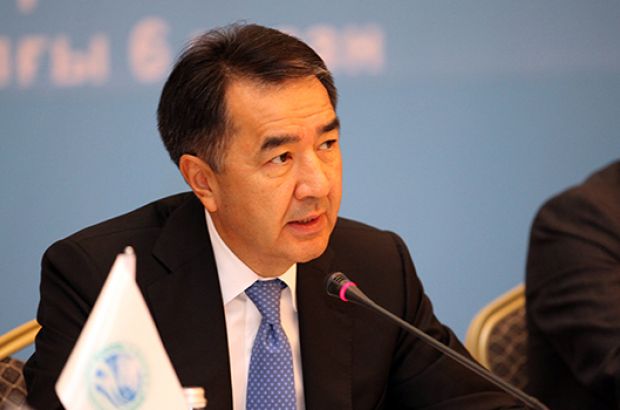ASTANA – Kazakh Prime Minister Bakytzhan Sagintayev and other top officials presented April 27 the outlines of the draft National Investment Attraction and Retention Strategy and the recently created Kazakh Invest national company as part of efforts to further attract foreign capital.
“Today, we are ready to present our vision of the solution to the task set by the President. Kazakh Invest has been formed on the basis of the old KAZNEX Invest with its complete restructuring. I was appointed the chairperson of the Board of Directors of the company. We deliberately raised its status to the level of a prime minister in order to stress the importance of our priorities in investment policy,” Sagintayev said during an April 27 briefing for the diplomatic corps at the Ministry of Foreign Affairs on the strategy and company, noting both are still under development.
Sagintayev told the gathering, which included ambassadors and top diplomats from around 60 countries as well as international organisations, the strategy and company are an attempt to reload Kazakhstan’s approach to attracting foreign investment to maintain the lead in this sphere and increase non-oil investment. He said the new strategy and company would also assist investors operating in the regions.
Head of the Vienna Office of the Investment Climate Practice Group of the World Bank Group’s Trade and Competitiveness Global Practice Ivan Nimac presented the draft of the National Investment Attraction and Retention Strategy.
The strategy is a roadmap to diversify the share of investments with high added value focused on increasing efficiency, he said.
“The types of investments must be changed to facilitate the process of economic diversification. They should be focused not only on raw materials or natural resources, they should move towards other types of investments: qualitative and quantitative. We are looking for more effective investments to ensure economic growth and modernisation,” Nimac said.
Nimac said the strategy’s goals would be achieved by attracting new types of investments, increasing the benefits of existing foreign direct investments, conducting strategic privatisation and using more widely public-private partnerships (PPPs).
Kazakh Minister for Investments and Development Zhenis Kassymbek said the new strategy will be developed by the end of June and focus on defining priority investment industries and developing an Investment Project Map, identifying target companies and international investment funds and improving the investment environment, investment attracting mechanisms and financial instruments.
The strategy was developed with the help of World Bank experts and incorporates recommendations from the Organisation for Economic Cooperation and Development, said Sagintayev.
Chairperson of the Board of Kazakh Invest Maksat Kabashev and Kassymbek briefed the diplomats on the company’s goals, tasks and interaction with state bodies and investors.
“Kazakh Invest is not only a new name; it is the emergence of a whole new paradigm. Our focus is on investors. We find new investors, but we don’t forget about the existing ones. We know what they want and we want them to work in Kazakhstan. The main principle of Kazakh Invest is to help, without hindering,” Kabashev said. “This means moving to a more efficient, rational and business-oriented form of attracting investment to the country.”
Kazakh Invest will operate on a “one-stop shop” and will accompany investors through the entirety of their projects, from pitching them opportunities, to preparing investment proposals to the implementation and functioning of the business, Kassymbek said.
The company has offices abroad and in all Kazakh regions. The board of directors headed by the prime minister also includes heads of ministries and top-level foreign consultants.
“To date, nineteen sectors have been created in the regions to provide services to investors. In the regions, representatives of Kazakh Invest will be given the status of external advisors to akims (governors and mayors) of the regions and cities of Astana and Almaty,” Kassymbek added.
Kassymbek said a monitoring system will also be introduced allowing investors to monitor online the progress of the services they receive.
Kassymbek also updated the diplomatic corps on measures that have already been carried out, including simplification of licensing procedures reducing required permits, encouraging public-private partnerships, establishing free economic zones, adopting a new law on arbitration and appointing an investment ombudsman.
These measures have resulted in foreign investment in 2016 of $20.6 billion, which is a 40 percent increase over 2015. Kazakhstan currently ranks 35th on the World Bank’s (WB) Doing Business Index.
Kassymbek also praised the activities of organisations such as the Council of Foreign Investors under the President, the Council for Improving the Investment Climate under the Government, the Kazakhstan Foreign Investors Council Association, the European Business Association of Kazakhstan and the Investment Ombudsman Institute.

